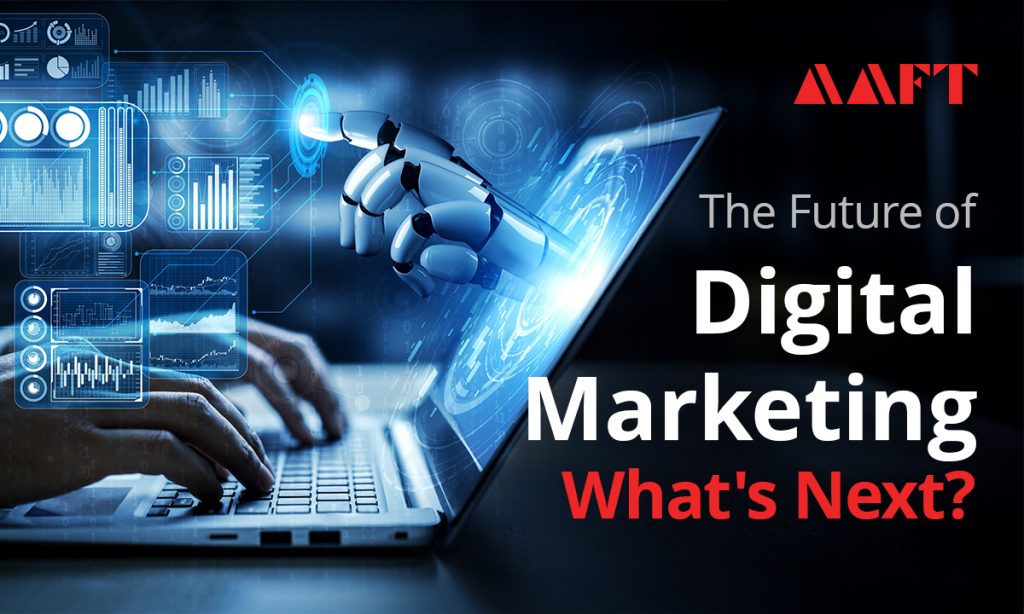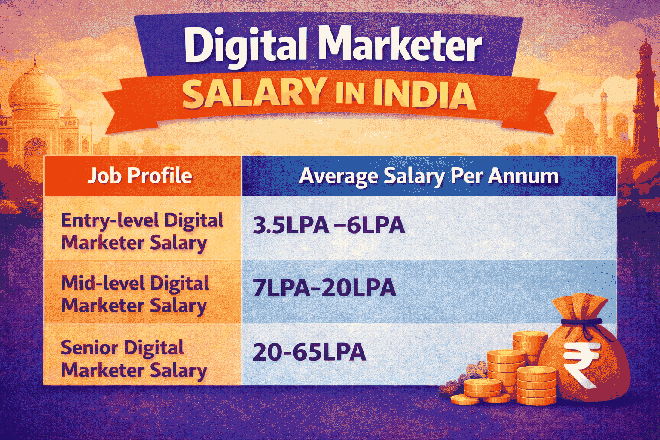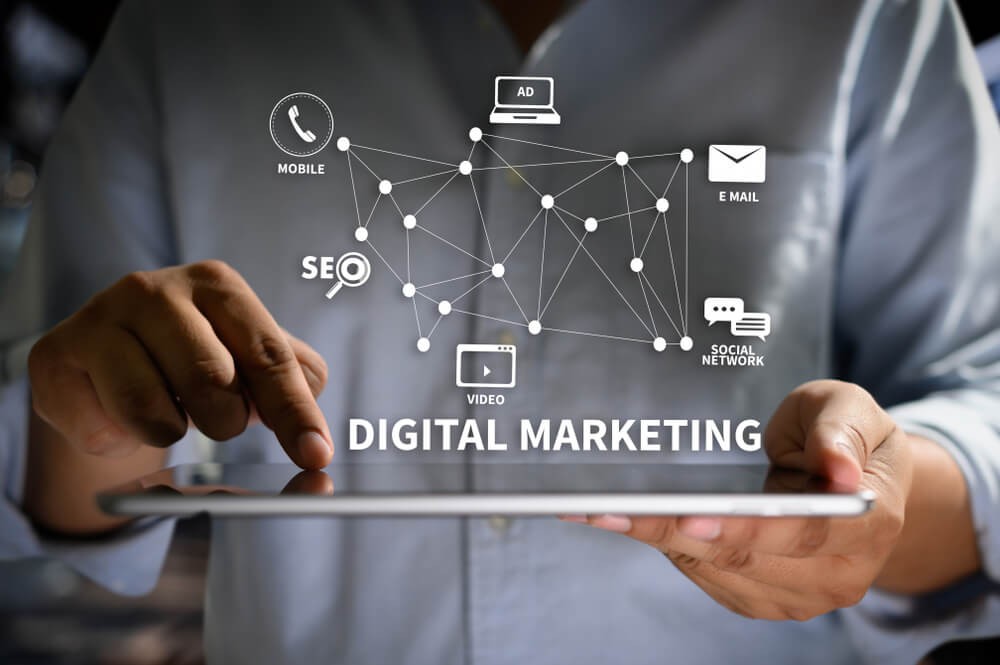The Future of Digital Marketing: What’s Next?
We all live in the Digital era and Digital marketing is the need of the hour in order to cater to today’s audience. In the rapidly evolving landscape of the 21st century, traditional marketing strategies are fading away day by day and the craze of digital marketing booming.
In this blog, we will explore what digital marketing is, why the future of digital marketing is good, and some of the trends that are shaping the destiny of this ever-expanding field.
What is Digital Marketing?
The first question that arises in everybody’s mind is what is Digital marketing? So here is the answer to that question, It encompasses a vast array of strategies and techniques employed by businesses and individuals to promote their products, services, or ideas through digital channels. These channels include websites, search engines, social media, email, mobile apps, and more.
Digital marketing leverages the power of the internet to reach and engage with target audiences in a more personalized and interactive manner than traditional marketing.
Read Also: Why Digital Marketing Offers a Promising and Rewarding Career Path
Key components of digital marketing include:
Search Engine Optimization (SEO):
SEO is a multifaceted approach to improving a website’s visibility on search engines like Google, Bing, and Yahoo. It involves optimizing both on-page and off-page elements to increase organic (non-paid) traffic to a website. Key components of SEO include keyword research, content optimization, backlink building, technical optimization, and continuous monitoring to improve rankings in search engine results pages (SERPs).
Read Also: Mastering SEO: Tips and Tricks for Better Search Engine Rankings
Content Marketing:
Content marketing is a strategic approach that focuses on creating and distributing high-quality, relevant, and valuable content to engage and educate a target audience. The primary goal is to attract and retain a defined audience while building brand authority and trust. Content can take various forms, such as blog posts, videos, infographics, eBooks, and more, and it is often used to address customer pain points and answer their questions.
Social Media Marketing:
Social media marketing involves leveraging social media platforms like Facebook, Twitter, Instagram, LinkedIn, and others to connect with target audiences. It aims to build brand awareness, engage with followers, and drive traffic and sales. Strategies include creating and sharing content, running paid advertising campaigns, and fostering community interactions to build a loyal following.
Email Marketing:
Email marketing is a direct communication channel with customers and prospects. It entails sending targeted emails to a list of subscribers to promote products, services, or content. Email marketing also includes nurturing customer relationships through personalized messaging, newsletters, and automation to deliver the right message at the right time.
Pay-Per-Click Advertising (PPC):
PPC is an online advertising model where advertisers pay a fee each time their ad is clicked. It’s a way to drive immediate traffic to a website or landing page. Popular PPC platforms include Google Ads (formerly AdWords) and Bing Ads. Advertisers bid on specific keywords, and their ads appear at the top of search results or on relevant websites, helping to generate leads or sales.
Influencer Marketing:
Influencer marketing involves collaborating with individuals who have a strong online presence and a significant following in a specific niche or industry. Influencers promote products or services to their audience through authentic content, reviews, or endorsements. This approach leverages the influencer’s credibility and reach to increase brand visibility and trust.
Read Also: Strategies And Tactic For Mastering Digital Marketing
Why is the Future of Digital Marketing Important?
The future of digital marketing is critical for several reasons:
- Changing Consumer Behavior: As more people spend time online, businesses must adapt to meet their customers where they are. Digital marketing allows for real-time engagement with these changing consumer behaviors.
- Cost-Effective: Digital marketing often offers a better return on investment (ROI) than traditional marketing methods. Advertisers can target specific demographics and track campaign performance, optimizing spending for better results.
- Global Reach: With the internet’s global reach, digital marketing enables businesses to expand their audience beyond geographical boundaries.
- Personalization: Digital marketing allows for highly personalized messaging, leading to more relevant and engaging interactions with customers.
- Measurable Results: Unlike traditional marketing, digital marketing provides tools to measure the success of campaigns accurately. Marketers can track metrics like website traffic, conversion rates, and customer engagement.
Role of AI in Digital Marketing
Artificial Intelligence in Digital marketing, in the context of digital marketing, refers to the application of machine learning algorithms and computer systems to analyze vast amounts of data, extract valuable insights, and make data-driven decisions. It’s a multifaceted tool that plays a pivotal role in various aspects of digital marketing.
Read Also: Top Tips and Tricks for Video Marketing
Personalized Customer Experiences
One of the most significant contributions of AI to digital marketing is personalization. AI algorithms analyze user behavior, preferences, and historical data to create highly personalized marketing content. This enables businesses to send tailored messages and recommendations to individual customers, thereby increasing engagement and conversion rates.
For instance, e-commerce giants like Amazon and Netflix use AI-powered recommendation engines to suggest products or content based on a user’s past interactions. This level of personalization enhances user satisfaction and drives sales.
Enhanced Content Creation
AI is also making waves in content creation. Natural Language Processing (NLP) algorithms enable AI systems to generate high-quality, relevant content. Marketers can use AI tools to create blog posts, product descriptions, and even social media updates. This not only saves time but also ensures that the content aligns with the latest SEO trends and user preferences.
Smarter Advertising Campaigns
AI-powered advertising is another area where AI shines. Programmatic advertising platforms use AI to optimize ad targeting, placement, and bidding in real-time. This ensures that marketing budgets are utilized efficiently, as ads are shown to the right people at the right time and on the right platforms.
Furthermore, AI can predict trends and analyze competitor strategies, helping marketers refine their campaigns for better results. It’s like having a data-driven crystal ball to foresee market shifts.
Chatbots and Customer Support
AI-driven chatbots have become indispensable in providing round-the-clock customer support. They can answer customer queries, guide them through the sales process, and even handle basic transactions. This not only improves customer satisfaction but also reduces the workload on human support teams.
Conclusion
Read Also: Why is Content The King Of Digital Marketing?
The future of digital marketing is not only important but inevitable in today’s digital age. Businesses that embrace the latest trends and adapt to changing consumer behaviors are likely to thrive in this dynamic landscape. In the digital age, AI is a game-changer. Mastering GEN AI keeps you at the forefront of marketing trends. If you want to stay ahead in the field of digital marketing from the beginning you can pursue a B.Sc and M.Sc in Digital Marketing from AAFT at a very affordable price.
As technology continues to advance, digital marketing will remain a cornerstone of successful marketing strategies. Stay tuned for the exciting developments that lie ahead in this ever-evolving field.
FAQ
What is digital marketing and how does it differ from traditional marketing?
Digital marketing uses online channels like websites, social media, and email for real-time, personalized advertising, unlike traditional marketing’s static methods.
Why is the future of digital marketing important for businesses?
It’s crucial for adapting to changing consumer behavior, cost-effective advertising, global reach, personalization, and measurable results.
How can businesses keep up with evolving digital marketing trends?
Stay updated through continuous learning, industry blogs, webinars, and consider expert partnerships. Regularly analyze performance data.
How can small businesses and startups benefit from digital marketing?
They can leverage cost-effective strategies like social media, content marketing, and local SEO to reach target audiences without huge budgets.











